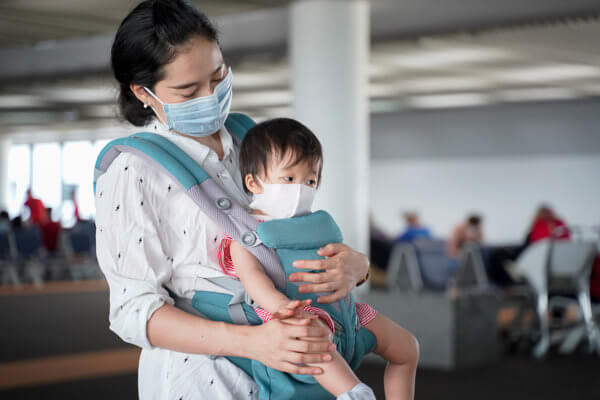By Alexa Joy Sherman
I’ve taken my son’s temperature dozens of times since he was born, but one thing that never gets easier is seeing the number on the thermometer soar. The higher it climbs, the more concerned I become—and I’m hardly alone. Fever is one of the most common reasons why parents visit emergency rooms with an infant or child, according to the American College of Emergency Physicians (ACEP), and it’s the top reason why they call their child’s doctor, says Ari Brown, M.D., a pediatrician in Austin, Texas, and coauthor of Toddler 411: Clear Answers & Smart Advice for Your Toddler (Windsor Peak Press, 2006).
Put the number in perspective
Most people have been taught that any temperature over 98.6 degrees Fahrenheit constitutes a fever—but that’s not entirely accurate. In fact, a child’s body temperature can fluctuate by one to two degrees throughout the day, notes the National Institutes of Health (NIH). It tends to be lowest in the morning and highest at night. The ACEP considers a fever to be a rectal temperature above 100.4 degrees F or an oral temperature above 99.5 degrees F. Meanwhile, fever is actually a good thing. The bacteria and viruses that cause infection thrive at a normal body temperature, but become threatened under more sweltering conditions.
A fever also prompts your immune system to produce more white blood cells, antibodies and other infection fighting agents, explains the NIH. It’s important to understand that the fever itself will rarely be harmful to your child. “Fever is not a disease, and kids will not self-destruct with a fever,” says Brown. If caused by infection, it will rarely go over 105 degrees F (unless the child gets overheated by excessively heavy clothing or other environmental conditions), and brain damage generally will not occur unless the fever rises above 107.6 degrees F, according to the NIH.
{pagebreak}
Consider the source
Above all, fever is one of many useful clues that all is not well with your child. “Look for symptoms like vomiting, diarrhea, runny nose, cough, decreased appetite, a sore throat or a rash,” suggests Brown. “If you can’t figure out the cause of the fever, it’s time to get professional help.” Typically, the symptoms will point to a viral or bacterial infection. Children tend to have an average of nine upper respiratory tract infections a year that include fever—and kids in daycare or preschool often have more, notes the ACEP. “There are other causes for fever, but infection tops the list,” says Brown.
Take appropriate action In the case of a viral infection (such as a cold, flu or stomach bug)—often indicated by a runny nose, cough, vomiting and/or diarrhea—you may not even need to see the doctor. “Viral infections usually do not require medication and are fought off effectively by the body’s immune system,” Brown explains. Of course, try to make your child as comfortable as possible with lightweight clothing and blankets, and plenty of rest, fluids and TLC. Use a feverreducer like acetaminophen or ibuprofen to bring the temperature down (see box below for more on OTC meds).
If the symptoms suggest a bacterial infection— or something more serious—you should see your pediatrician. “Bacterial infections frequently arise secondary to a pre-existing viral illness,” Brown says. “Red flags include a child who is ill and suddenly gets worse instead of better; for example, a new fever, new green snot, new irritability or new labored breathing.”
Most importantly, pay attention to your child’s behavior. If he is irritable, lethargic, disoriented, inconsolable, having trouble sleeping or shows signs of dehydration (such as not producing tears and/or not urinating at least three times in 24 hours), call the doctor. You should also seek medical attention if the fever lasts for more than three or four days, is getting progressively higher or no obvious symptoms accompany it.
Go to the next page for the best over-the-counter treatment options…
{pagebreak}
Expert advice on OTC fever treatment options:
» Choose appropriately. Ibuprofen lasts longer (dose every 6 hours) than acetaminophen, but can upset the stomach. Pediatrician Ari Brown, M.D., suggests using acetaminophen (dose every 4 hours) on an empty stomach or for stomach viruses, and ibuprofen in other cases (especially at night).
» Be precise. Infants’ formulas are more concentrated than children’s, and dosage amounts vary according to body weight. “Always use the dropper or cup that comes with the package and read the directions,” says Brown.
» Don’t expect miracles. “Both acetaminophen and ibuprofen are good fever reducers—not fever eliminators,” Brown points out. “At best they’ll bring down the temperature by two degrees.”
» Avoid aspirin. In rare cases, aspirin has caused Reye Syndrome (a serious, sometimes fatal, illness) in kids with fl u or chicken pox. So opt not to use it, advises the American Academy of Family Physicians.
Go to the next page for our Top Thermometer Picks…
{pagebreak}
Thermometers have come a long way from the mercury-in-glass variety, which the American Academy of Pediatrics (AAP) says to eliminate, due to mercury’s toxicity. The best bet for a reliable reading: “Rectal thermometers are the most accurate way,” says pediatrician Ari Brown, M.D. However, getting your tot to cooperate with this method may not be easy. In that case, get a reading however you can—orally, in the ear or under the arm, bearing in mind that these may be off by about a degree. Two of our top thermometer picks:
Safety 1st Hospital’s Choice 8-Second Digital Thermometer
When used rectally, you’ll get a reading in as little as eight seconds. You can also get a 20-second reading using it orally or under the arm. $9.99. Buy it here.
Braun Thermoscan 3020 Ear Thermometer
This speedy thermometer measures temperature in the ear in just one second. $34.99. Buy it here.
Encino, Calif.-based freelance writer Alexa Joy Sherman always has a digital thermometer at the ready for her 21-month-old son, Jack.
Here’s the lowdown on how to treat it and when to see a doctor.




